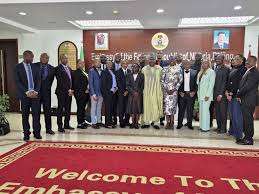In a landmark move towards border modernization, Nigeria and China have deepened customs cooperation, spotlighting a future where trade facilitation is driven by technology, not paperwork.
The Nigeria Customs Service (NCS) and China’s General Administration of Customs (GACC) have announced a strengthened partnership focused on modern customs methodologies, tech-driven training systems, and intelligence exchange.
The announcement came after a high-level delegation of 21 Nigerian customs officials, led by Oluyomi Adebakin, Commandant of the Nigeria Customs Command and Staff College (NCCSC), visited Beijing for a series of strategic engagements.
These sessions were hosted by GACC’s International Cooperation Division, the Training and Education Centre, and the prestigious Shanghai Customs College.
According to NCS spokesperson Abdullahi Maiwada, the meeting signifies “a new chapter in customs diplomacy,” reflecting Nigeria’s ambition to become a leader in digital trade regulation in West Africa.
VR Training and Smart Border Systems
China shared insights into its high-tech training infrastructure, which includes virtual reality (VR) simulations, 5G-enabled systems, and blended e-learning strategies. In 2024 alone, GACC developed over 360 online courses and conducted thousands of physical training sessions, illustrating the depth of its digitization.
Nigeria’s customs officers will now have access to future GACC courses and exchanges, including participation in Shanghai Customs College’s modernization curriculum.
This is not the first time Nigerian officers have benefited from China’s customs knowledge transfer. Since 2023, 89 Nigerian customs officers have received training as part of a broader African initiative on anti-smuggling, digital port operations, and food safety protocols.
The bilateral discussions didn’t just center on training. Both countries explored deeper collaboration in areas such as port digitization, regional intelligence sharing, and joint customs research. There is growing momentum behind designing smarter, faster border systems for Africa’s most populous nation.
“China sees Nigeria not just as a trading partner but as a strategic collaborator in redefining how global South-South trade can be governed,” a senior customs official involved in the talks noted.
Why It Matters
China’s praise extended beyond technical collaboration. Officials from GACC commended recent structural reforms within NCS and acknowledged Nigeria’s expanding role on global customs platforms. The election of Nigeria’s Comptroller-General, Bashir Adewale-Adeniyi, as Chair of the World Customs Organization (WCO) Council, was described as a milestone in global customs diplomacy.
As Nigeria works to modernize its trade environment, partnerships like this may determine the pace and success of reform. And for a generation of tech-driven customs officers, the future might be less about checking containers and more about reading data streams.
This bilateral partnership signals a quiet but important shift: customs is no longer just about control it’s about connection.
Talking Points
A Glimpse of What Border Management Should Look Like in Africa. The Nigeria–China customs partnership is a timely wake-up call. In a continent where manual paperwork, corruption, and weak port logistics have crippled trade efficiency, the pivot to smart customs training using VR, 5G, and AI-driven models is a blueprint worth emulating.
It proves that digital transformation isn’t just for tech startups—it’s critical for border security and economic growth.
Africa Needs More than Trade Deals—We Need Smart Trade Infrastructure. Nigeria’s move shows it understands something many African nations still don’t: trade agreements are useless without strong digital infrastructure at the borders.
If goods can’t move efficiently because of outdated customs systems, our participation in agreements like AfCFTA becomes cosmetic. This collaboration could position Nigeria as a digital trade gateway—if we implement it fast enough.





